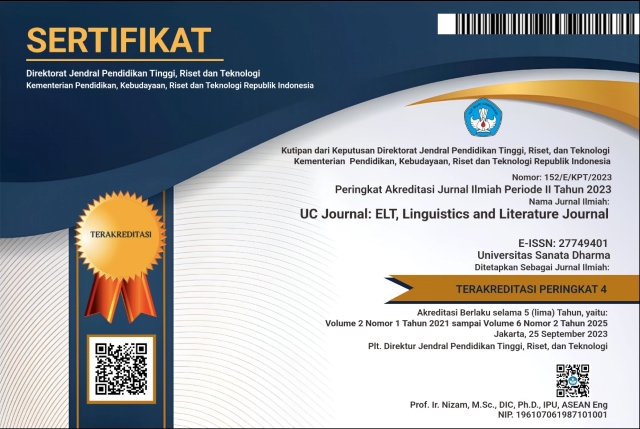INDIVIDUAL VARIATIONS IN MONITOR HYPOTHESIS OF MICRO TEACHING STUDENTS
Abstract
The paper aims to find out the types of users in performing English as a second language and to figure out principal conditions that might affect students monitoring process as proposed by Krashen (1982). Two research problems were formulated, namely: First, what individual variations are shown by students in the Micro Teaching class? Second, to what extent do Micro teaching students regard the three principal conditions in the monitor hypothesis? Both qualitative and quantitative methods were used. The qualitative method of data collection was participant observation. Nineteen students Micro Teaching videos were recorded to be observed to answer the first research problem. The quantitative method was applied through a questionnaire to answer the second research problem. An interview was also done to support the analysis of the questionnaire. The results showed that only two types of monitor users occurred in Micro Teaching Class A. The two types were monitor under-users, who were not aware of the conscious checking, and monitor over-users, who seemed to consciously check their L2 output.
Keywords
Full Text:
PDFReferences
Adams, A. & Cox, A. (2008). Questionnaires, in-depth interviews and focus groups. Retrieved from http://oro.open.ac.uk/11909/1/9780521870122c02_p17-34.pdf
Andrews, S. (2003). Teacher language awareness and the professional knowledge base of the L2 teacher. Language Awareness, 12(2), 81-95.
Asril, Z. (2013). Micro teaching. Jakarta: Rajawali Press.
Baskara, F.X.R. (2015). Facilitating second language acquisition through digital storytelling. Journal of language and literature, 15(2), 148-152.
Bowen, G. A. (2009). Document analysis as a qualitative research method. Qualitative research journal, 9(2), 27-40.
Brown, J. D., and Rodgers, T. S. (2002). Doing second language research. Oxford: Oxford University Press.
Cook, V. (1993). Linguistics and second language acquisition. New York: St.Martin's Press.
Creswell, John. W. (2003). Research design: Qualitative, quantitative, and mixed methods approaches (2nd ed). London: Sage Publication.
Ellis, R. (1985). Understanding second language acquisition. Oxford: Oxford University Press.
Ellis, R. (2008). The study of second language acquisition (2nd ed.). Oxford: Oxford University Press.
Gass, S. M. (2001). Second language acquisition: An introductory course (2nd ed). London: Lawrence Erlbaum Associates, Inc.
Griffee, D. T., (2012). An introduction to second language research methods: Design and data. Berkeley: TESL-EJ Publication.
Hennink, M., Hutter, I., & Bailey, A. (2011). Qualitative research methods. London: Sage Publication.
Hopkins, W. G. (2008). Choosing and fine-tuning a design for your study. Sportscience, 12, 12-21.
Iswandari, Y. A. (2017). Revealing pre-service foreign language teachers imagined professional identity in reflective journals. Language and Language Teaching Journal (LLT), 20(1), 59-67.
Johnson, B., and Christensen, L. (2012). Educational research 4th ed.: Quantitative, qualitative, and mixed approaches. London: Sage Publication.
Kounin, T.E. & Krashen, S.D. (1978). Approaching native speaker proficiency from two different directions. In C.H. Blatchford and J. Schachter (Eds.), TESOL 78: EFL policies, programs, practices (86-104). Washington: TESOL.
Krashen, S. D. (1981). Second language acquisition and second language learning. Oxford: Pergamon Press.
Krashen, S. D. (1982). Principal and practice in second language acquisition. Oxford: Pergamon Press.
Krashen, S. D. (1983). The Natural Approach: Language acquisition in the classroom. Oxford: Pergamon Press.
Krashen, S. D. (2013). Second language acquisition: Theory, applications, and some conjectures. Cambridge: Cambridge University Press.
Krashen, S. D. (2014). Stephen Khrasens theory of second language acquisition.Retrieved from http://www.sk.com.br/sk-krash.html.
Leedy, P. D. (1993). Practical research: Planning and design. Upper Saddle River, NJ: Prentice-Hall.
Lelita, Y. V. (2016). A Study on students learning strategies and self-efficacy in speaking I class in ELESP of Sanata Dharma University. Language and Language Teaching Journal (LLT), 19(1), 61-70.
Lodico, M. G., Spaulding, D. T., & Voegtle, K. H. (2006). Methods in educational research: From theory to practice. San Fransisco, CA: Jossy-Bass.
Masciantonio, R. (1988). Stephen Krashen and the classical languages. The classical journal, 84(1), 53-56.
McDonald, R. & Kasule, D. (2005). The monitor hypothesis and English teachers in Botswana: Problems, varieties, and implications for language teacher education. Language, culture and curriculum, 18(2), 188-200.
McLaughlin, B. (1978). The monitor model: Some methodological considerations. Language learning, 28, 309-332.
Patton, M. O. (1980). Qualitative evaluation methods. Beverly Hills, CA: Sage Publication.
Shishavan, H. B. & Sadeghi, K. (2009). Characteristics of effective English language teachers as perceived by Iranian teachers and learners of English. Retrieved from http://www.ccsenet.org/journal/index.php/elt/article/viewFile/4462/3803.
Zafar, M. (2009). Monitoring the monitor: A critique of Krashens five hypotheses. The Dhaka University Journal of Linguistics, 2(4), 139-146.
DOI: https://doi.org/10.24071/uc.v1i2.2958
Article Metrics
Abstract view : 1972 timesPDF view: 1055 times
Refbacks
- There are currently no refbacks.
UC Journal is indexed in:
UC Journal Sinta 4 Certificate (S4 = Level 4)
We would like to inform you that UC Journal: ELT, Linguistics and Literature Journal, or UC Journal has been nationally accredited Sinta 4 by the Ministry of Education, Culture, Research and Technology of the Republic of Indonesia based on the decree No. Surat Keputusan 152/E/KPT/2023. Validity for 5 years: Vol 2 No 1, 2021 till Vol 6 No 2, 2025
DOI: https://doi.org/10.24071/uc
e-ISSN (validity starting Vol 1, No 2, November 2020): 2774-9401

This work is licensed under CC BY-SA.
Creative Commons Attribution-ShareAlike 4.0 International License
 UC Journal: ELT, Linguistics and Literature Journal, a scientific peer-reviewed journal, was established in 20 May 2020 and is published twice a year, namely in May and November, by the English Language Education Study Programme (S1/Sarjana PBI) in collaboration with the English Education Master's Programme (S2/Magister PBI) of Sanata Dharma University, Yogyakarta, Indonesia.
UC Journal: ELT, Linguistics and Literature Journal, a scientific peer-reviewed journal, was established in 20 May 2020 and is published twice a year, namely in May and November, by the English Language Education Study Programme (S1/Sarjana PBI) in collaboration with the English Education Master's Programme (S2/Magister PBI) of Sanata Dharma University, Yogyakarta, Indonesia.














